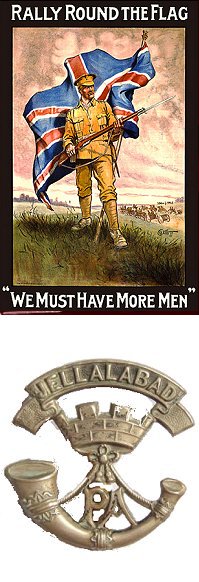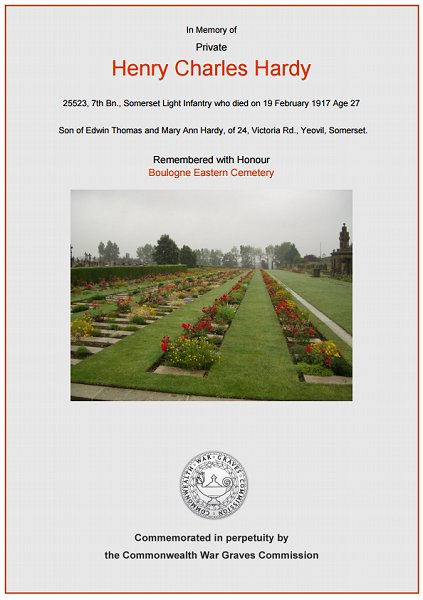yeovil at War
Henry Charles hardy
Died in France of his wounds
Henry Charles Hardy was born on 9 June 1889 at Yeovil Marsh. He was the son of engine driver, later laundry owner, Edwin Thomas Hardy (1861-1921) and Ann Maria née Brown (1862-1937). In the 1891 census Edwin and Mary were living in Yeovil Marsh with their four children; William Thomas (b1883), Annie (b1885), Edwin George (1887-1914) and 2-year old Henry. Edwin gave his occupation as an engine driver in a glove factory. By 1901 the family had moved to 10 Victoria Road and there was another daughter, Mary Alice (b1894), to complete the family.
By the time of the 1911 census Edwin and Mary, together with Henry and Mary Jnr. had moved along Victoria Road to number 24 (or else the road was re-numbered, which was quite common in Yeovil around this period). Edwin gave his occupation as a laundry proprietor and Henry was listed as a laundry worker.
Henry's older brother Edwin George was a professional soldier who had joined the army in 1904 and saw service with the Worcestershire Regiment in India. On the outbreak of war in August 1914 he was sent to France but was killed in the day-to-day trench warfare at Vailly-sur-Aisne on 20 September 1914 - just a month after war was declared. He was aged 28.
 Henry
enlisted at
Yeovil, joining
the 7th
(Service)
Battalion,
Somerset Light
Infantry. His
Service Number
25523 suggests
that he enlisted
at the end of
May 1916. He was
most likely sent to France
in October
1916 at which
time the 7th
Battalion were
fighting in the
Battle of Le
Transloy Ridges
(1 to 18 October
1916).
Henry
enlisted at
Yeovil, joining
the 7th
(Service)
Battalion,
Somerset Light
Infantry. His
Service Number
25523 suggests
that he enlisted
at the end of
May 1916. He was
most likely sent to France
in October
1916 at which
time the 7th
Battalion were
fighting in the
Battle of Le
Transloy Ridges
(1 to 18 October
1916).
The Battle of Le Transloy began in good weather and Le Sars was captured on 7 October. Pauses were made from 8–11 October due to rain and 13–18 October to allow time for a methodical bombardment, when it became clear that the German defence had recovered from earlier defeats. Haig consulted with the army commanders and on 17 October reduced the scope of operations by cancelling the Third Army plans and reducing the Reserve Army and Fourth Army attacks to limited operations in co-operation with the French Sixth Army. Another pause followed before operations resumed on 23 October on the northern flank of the Fourth Army, with a delay during more bad weather on the right flank of the Fourth Army and on the French Sixth Army front, until 5 November. Next day the Fourth Army ceased offensive operations except for small attacks intended to improve positions and divert German attention from attacks being made by the Reserve / Fifth Army.
After the battle the 7th Battalion resumed daily life in the mud of the Somme trenches until 9 October 1916 when the Battalion left the Front Line and was billeted, first in Corbie then an the 19th to Allonville. Several moves followed until 12 December when the Somerset men relieved the 10th King's Royal Rifles in the trenches between Les Boeufs and Morval. The private diary of Colonel Troyte-Bullock (commanding 7th Somersets) records an interesting item concerning this period that was repeated in the Regimental History of the Somerset Light Infantry "Sergeant Dawson, who was always a keen patroller, went out into No Man's Land as soon as the relief was completed to have a look at the wire. He got some way into No Man's Land when he became hopelessly bogged and unable to move. He was found by a party of 5 Bosche who proceeded to pull him out. He, of course, expected to be taken off to the Hun lines, but not a bit of it. They informed him that they were his prisoners and demanded to be taken across to our trenches. Sergeant Dawson had hopelessly lost his way and said so, but they said it was quite all right as they knew the way and conducted him back to our advanced Bn. HQs. On the way they picked up another of our men, also bogged, and took him along with them. Major Preston-Whyte (temporarily in command of the Battalion) was somewhat surprised when the sentry shouted down to say that there were five Huns coming down the stairs!"
The 7th Battalion were relieved on 14 December and spent Christmas and New Year in billets in Meaulte. On 1 January 1917 the 7th Somersets (in Brigade) marched from Meaulte to Combles where the Battalion relieved the 1st Irish Guards in front-line trenches situated on the far side of the village. The first fortnight of the New Year was uneventful although the enemy's guns were "unpleasantly active".
In February 1917 Henry was wounded in the day-to-day fighting in the trenches and hospitalised at Boulogne, where he died from his wounds on 19 February. He was 27 years old.
On 12 March 1917 the Western Gazette reported "Mrs Hardy of Victoria Road, has received an unofficial message, stating that her son, Private H Hardy, of the Royal Engineers (sic), has died of wounds received in action. This is the second son Mr and Mrs Hardy have lost in the war."
Henry was interred in Boulogne Eastern Cemetery - Grave VIII.B.184 and his name is inscribed on the War Memorial in the Borough below the name of his brother.
Other Yeovil men buried in Boulogne Eastern Cemetery include - Albert Bowden, Horace Heard and William Warren.
gallery

The Commonwealth War Graves Commission certificate in memory of Henry Hardy.